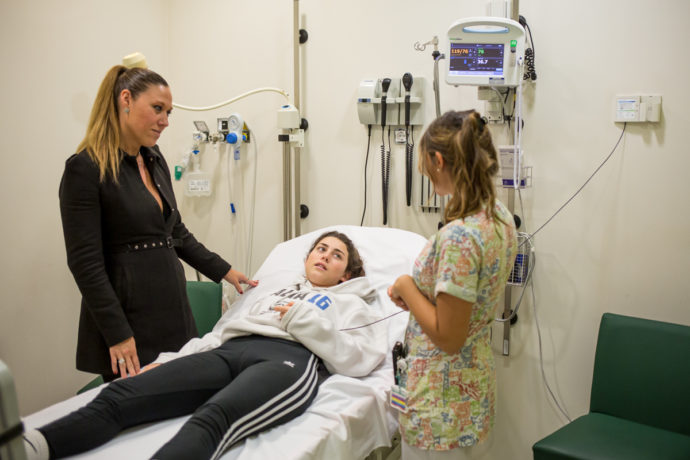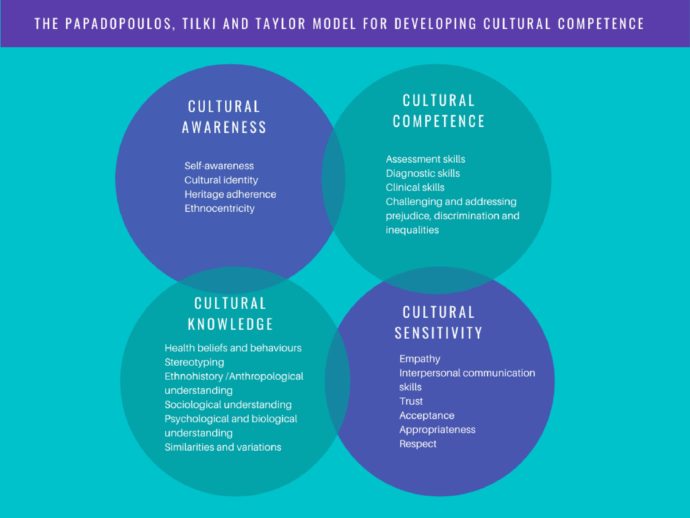In today’s world, nurses encounter culturally and linguistically diverse people continuously, so they must be able to provide care that takes into consideration their patients’ cultural diversity.
 Photograph ©Ariadna Creus and Ángel García, Banco de Imágenes Enfermeras
Photograph ©Ariadna Creus and Ángel García, Banco de Imágenes Enfermeras
To minimize health disparities among culturally and linguistically diverse patients, nurses aim to give culturally competent care to a variety of patients. This orientation in cultural competence focuses on patients’ cultural, social and linguistic needs, which advocates patient autonomy and seeks to improve the quality of the care provided.
The world we live in demands culturally competent nurses. Cultural competence can now be seen as a core requirement in nursing practice, since it has been regulated at the national level, e.g. in Finland in the Constitution (731/1999) and in the Act on the Status and Rights of Patients (785/1992), as well as in ethical guidelines for nurses at the international and national level (ICN 2012, Finnish Nurses Association 2020).
This article will briefly explore the concept of cultural competence, and how to develop it in nursing education through a MOOC (Massive Open Online Course) for nursing students. The authors, anthropologist and MBA student Henna Helminen, Project Manager Niina Glerean and Project Specialist Sari Myréen, were involved in creating the theoretical framework for a MOOC designed in the Erasmus+ project Care for Europe.
What is culture?
When defining cultural competence, it is important to understand the versatile concept of culture. Anthropologists emphasise that culture comprises multiple variables, but is not a single variable itself, and one way to look at it is as a shared system of knowledge, codes, symbols and meanings. According to this view, people organise their social life through these shared features (Geertz, 1960-1970). In addition to this, culture is often described as a shared set of beliefs and conventions that people have adopted as part of a certain group. Culture is thus a collective way of life that connects a certain group of people and distinguishes them from other groups (Gellner, 1997; de Munck & Bennardo, 2019).
This also means that culture is not inherent but something we adopt as part of the process of identifying ourselves to a certain group, and it constantly evolves in interaction with its surroundings (Gellner, 1997). Culture affects all aspects of experience and is inseparable from economic, political, religious, psychological, and biological conditions. It is a process through which ordinary activities and conditions take on an emotional tone and a moral meaning for participants (Kleinman & Benson, 2006).
When talking about cultural competence, it is critical to understand that culture cannot be reduced to a technical skill for which people can be trained to develop expertise, and it cannot be treated as a cluster of traits that are automatically assigned to certain group of people (Kleinman & Benson, 2006; Kleinman, 2012; Kleinman, 2016). It is also crucial to remember that most people do not belong in only one cultural category. People can identify themselves as being part of several different cultural categories at once. You can never tell beforehand all the cultural categories a person represents, or know how big of a role these different cultural aspects play in a person’s life.
How to define and develop cultural competence?
In everyday life, cultural competence refers to respecting the fact that people have adopted different cultures and hence have different mindsets and altering habits. It includes respecting how people function in different ways in varying situations. All in all, it is about creating and fostering an atmosphere of non-discrimination (Hagvist, Juntunen, Mikkonen, Oikarainen & Tuomikoski, 2020). Papadopoulos, Alleyne and Tilki (1995) define cultural competence in healthcare professionals as the capacity to provide effective healthcare, taking into consideration people’s cultural beliefs, behaviours and needs.
Both culture and cultural competence are ever changing processes, syntheses of vast amounts of knowledge and skills. People obtain the knowledge and skills needed in their professional and personal lives, and these accumulate continuously. The Papadopoulos, Tilki and Taylor model for the development of cultural competence in nursing (see the chart below) consists of four stages and the achievement of the fourth stage of cultural competence requires the synthesis and application of previously gained awareness, knowledge and sensitivity.
 The Papadopoulos, Tilki and Taylor model for the development of cultural competence in nursing.
The Papadopoulos, Tilki and Taylor model for the development of cultural competence in nursing.
Further emphasis is given to practical skills such as assessment of needs, clinical diagnosis and other caring skills (Papadopoulos & al., 2003). Cultural awareness begins with the recognition of your own cultural values and beliefs. The need to understand the construction of cultural identity and how it affects people’s health beliefs and practices are vital at this stage (Papadopoulos & al., 2003). Cultural knowledge can be enhanced by learning and seeking information about different cultures.
However, the most effective way to develop cultural competence is to have meaningful contact with people from different backgrounds (Papadopoulos, 2003). Cultural sensitivity has a lot to do with the healthcare professionals’ attitudes and desires. The patients in care need to be viewed as equal partners. The goal is to build a relationship where the other one does not use power in an oppressive way. This kind of relationship consists of acceptance, respect, trust, facilitation and negotiation (Papadopoulos & al., 2003).
Cultural sensitivity implies empathy, interpersonal and communication skills, trust, acceptance, appropriateness and respect. An important element in achieving cultural sensitivity is how professionals view people in their care and are aware of other cultures. A culturally sensitive person takes an active role in introducing their own culture to people from other cultures and facilitates their integration to another culture. They are interested in their background and perceptions. It is also important to create an approving and honest atmosphere in the interaction in a multicultural setting. Equal partnerships involve trust, acceptance and respect as well as facilitation and negotiation (Papadopoulos & al., 2003).
Developing cultural competence through a MOOC
Care for Europe Erasmus+ KA2 project aims to internationalise nursing courses through a better integration of incoming nursing students during their clinical placements. Digital pedagogical material created by the project partners based on the current intercultural competence development theories will help international nursing students orientate to their student exchange and clinical placement in a new country and culture as well as provide them with valuable country specific information related to their clinical placements, which will help them to integrate better to the new environment. In order to achieve this integration goal, one of the intellectual outputs of the project is a MOOC applying 360-degree images and VR technology to support the integration of international nursing students.
The first module of the MOOC will encourage students to reflect on their own personal values and beliefs to be more aware of their own cultural background. Students will also learn to understand the basic principles for developing cultural competence and critically examine the concepts of ethnocentricity and stereotyping (Papadopoulos & al., 2003).
The MOOC will give project country specific information about nursing profession, nursing education as well as the content of nursing work. The MOOC will also give information about the culture and language, which will help students to integrate better to the new environment and to the clinical placement. The MOOC will also offer meaningful encounters between the exchange students, local students and staff and it will offer a platform for discussions for nursing students around the world, which will eventually enhance their cultural knowledge and sensitivity. Moreover, the MOOC includes case studies describing challenging situations on the ward in patient interaction and within the professional teams. Providing thus the student with an opportunity to solve these cases in a safe and reflective environment where they can further develop their cultural skills through peer and nurse descriptor or teacher evaluation.
As mentioned before, the best way to gain cultural competence is to actively engage in meaningful relationships with people from different cultural spheres. It is quite difficult to define how exactly you can learn cultural competence, or measure your progress because gaining cultural competence can most adequately be described as a lifelong process. Nevertheless, a MOOC can offer you a pathway to personal development in this area, but in the end, it is up to which pathways you choose to take and how you commit to this process.
References:
- Finnish Nurses Association 2020. Code of ethics for nurses. https://sairaanhoitajat.fi/wp-content/uploads/2021/04/Co
- Geertz, C. 1963. Old Societies and New States. Aruevind Publishing Company.
- Geertz, C. 1996. After The Fact. Two countries. Four Decades. One Anthropologist. Harvard University Press. London, England.
- Geertz, C. 1983. Local Knowledge: Further Essays in Interpretive Anthropology. HarperCollins UK.
- Gellner, E. 1997. Nationalism. NYU Press.
- Hagqvist, P., Oikarainen, A. Tuomikoski A-M. Juntunen J. Mikkonen K. 2020. Clinical mentors’ experiences of their intercultural communication competence in mentoring culturally and linguistically diverse nursing students: A qualitative study. Nurse Educ Today 2020 Apr; 87:104348.
- ICN 2012 https://www.icn.ch/sites/default/files/inlinefiles/2012_ICN_Codeofethicsfornurses_%20eng.pdf
- Kleinman A. & Benson P. 2006. Anthropology in the Clinic: The Problem of Cultural Competency and How to Fix It. Plos Medicine. 24.10.2006.
- de Munck, V. & Bennardo, G. 2019. Current Anthropology 60(2). Disciplining Culture: A Sosiocognitive Approach.
- Papadopoulos, I., Tilki, M., Taylor, G. 2003. The Papadopoulos, Tilki and Taylor model for the development of cultural competence in nursing. Journal of Health, Social and Environmental issues 4 (1), 5–7.